#assad war crimes
Text

152 notes
·
View notes
Text
Just leaving this here.
Reblog the shit out of this.
Also this.
Fuck Erdogan for this shit!
#dougie rambles#news#political crap#syria#syrian civil war#rojava#north and east syria#assyria#bethnahrin#kurdistan#turkey#environmentalism#ecology#war crimes#terrorism#fuck Erdogan#leftism#anti imperialism#fuck Assad#fuck putin#reblog this#reblog the shit out of this
20 notes
·
View notes
Text
Today, in The USA and Israel are Miserable Pieces of Filth and The United Nations is The Rag it Uses to Wipe its Ass:

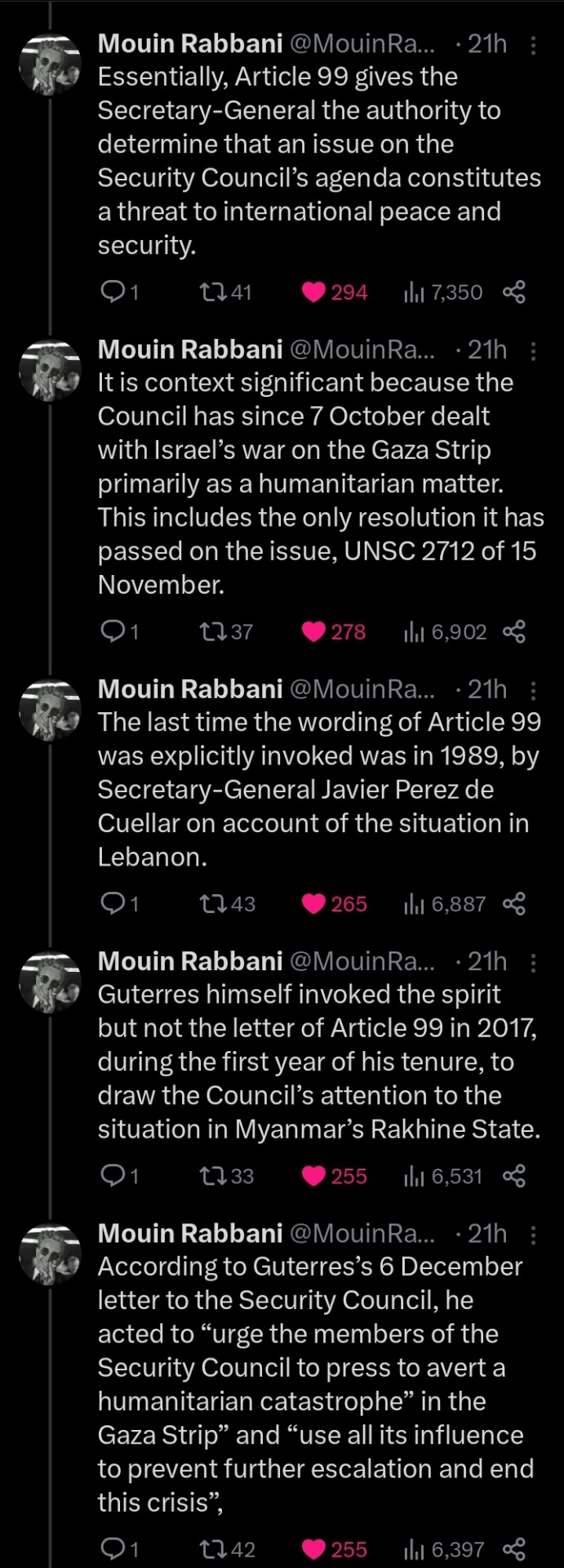
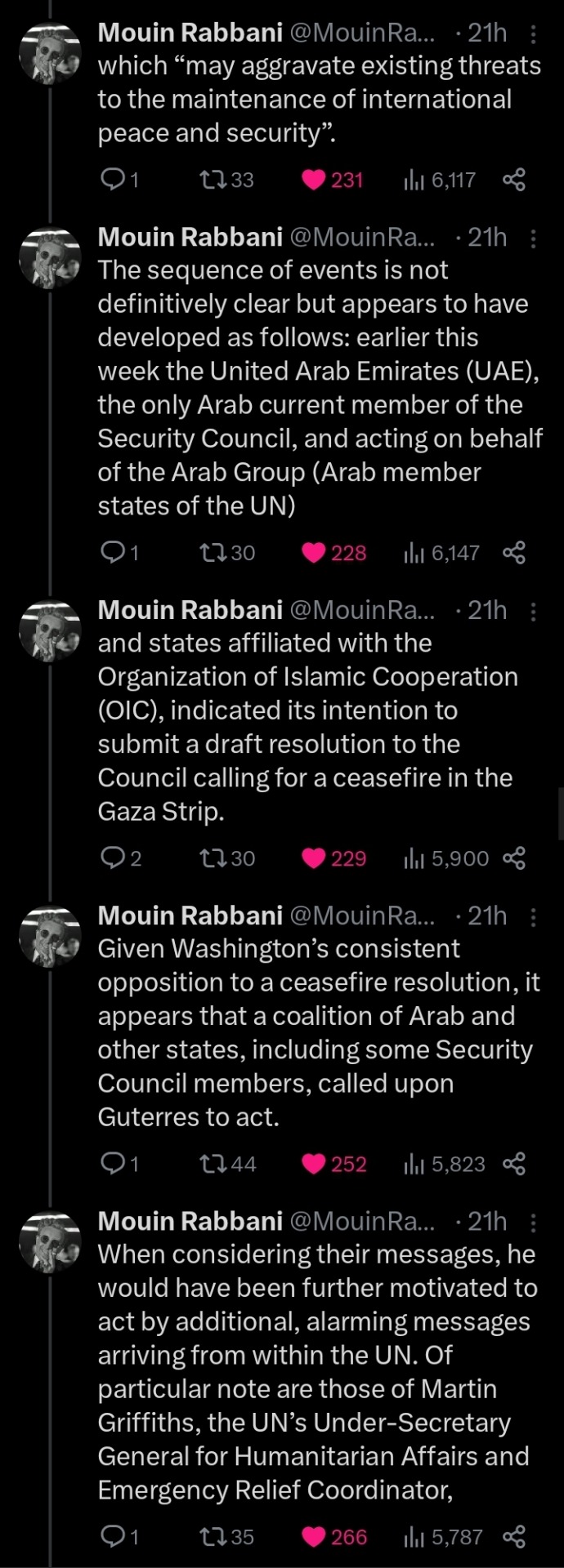



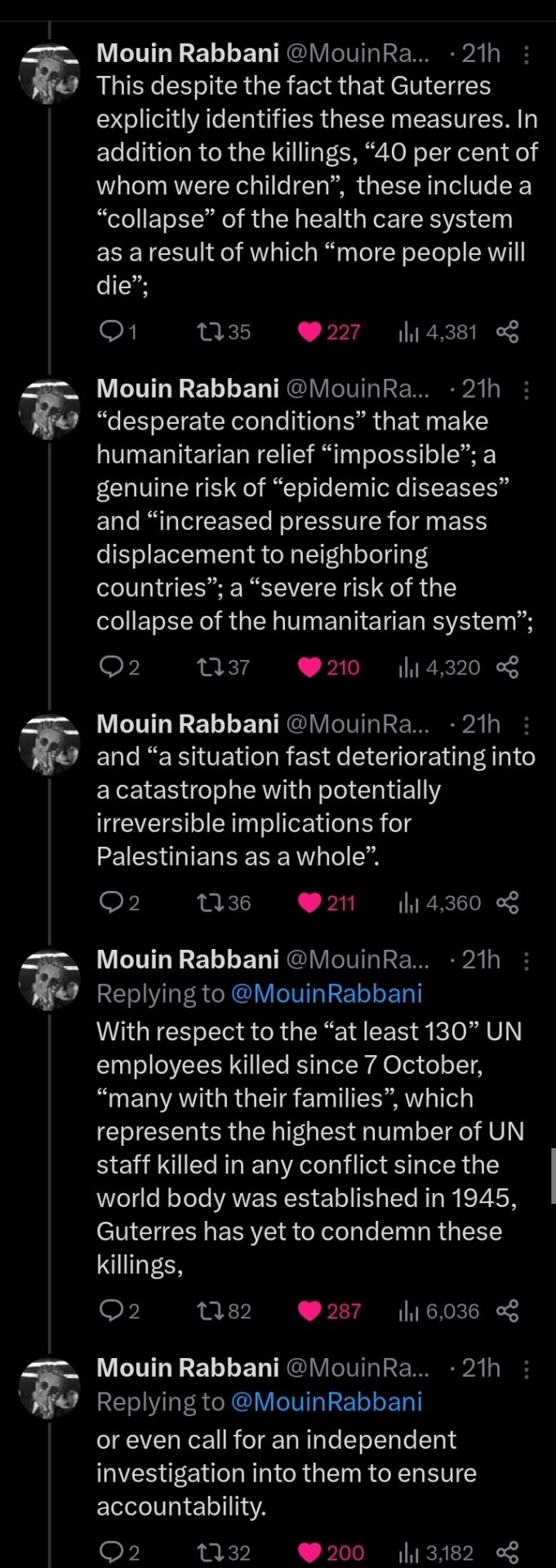



I just. Have no words.
Make no mistake that the UN is facilitating this genocide in concert with the rest of the West. If this doesn't break the UN then nothing will. If this isn't the last straw for Arabs then nothing will be.
#at this point i'm only surviving for my cats#we're just going to watch them die then?#fuck this Im throwing my full support behind Hamas‚ Houthis‚ Hezbollah‚ and the Muslim Brotherhood#I will never ever support Khamenei or Assad or Putin but their blood money is as good as the US's#the US government is the greatest terrorist organisation in the world and it's past time it was recognized as such#it's time the rest of the world got together to defeat it by any means necessary#glory to the resistance#free palestine#united nations#war crimes#palestinian genocide#gaza genocide#death to israel#death to america#death to the west#human rights violations#western imperialism#american imperialism#colonization#coloniality#global south#genocide joe#vote blue no matter who#vote biden#i/p#mouin rabbani#world politics#antonio guterres#knee of huss#colonialism
17 notes
·
View notes
Text
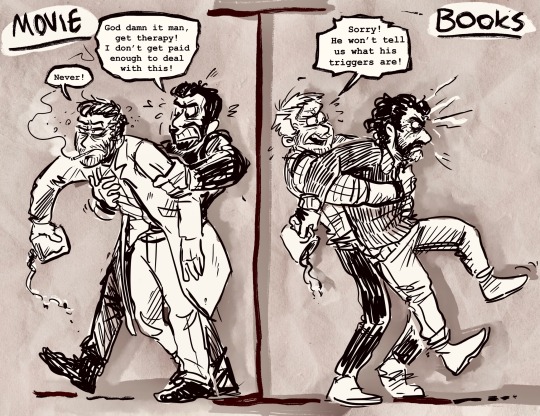
“Reign in your partner, detective!”
#grey art#fan art#department q#department q series#afdeling q#jussi adler olsen#Carl mørk#Assad#book recommendations#crime drama#found family at the office#I’m on book 3 don’t come near me with spoilers!#Assad is my beloved possible war criminal#Nordic noir#book recs#book fanart#underrated series
46 notes
·
View notes
Text
France: A Partner In Terrorism
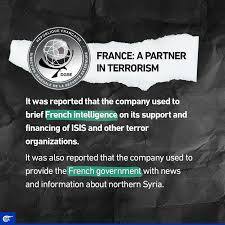
Lafarge Admits Funding ISIS In Syria
French company admits it gave financial support to ISIS, agrees to pay over $700 million in fines.
Washington — French cement company Lafarge has pleaded guilty to one count of providing material support to foreign terrorist organizations, admitting in court papers on Tuesday that it paid individuals designated by the U.S. as terrorists in Syria to secure the continued operation and protection of a cement plant from 2013 to 2014.
The company has agreed to pay $778 million in fines and forfeiture as part of the plea deal.
Beginning in 2010, Lafarge operated the Jalabiyeh Cement Plant in the Jalabiyeh region of Northern Syria. According to the statement of offense, the company admitted that after civil war broke out in the country in 2011, executives and intermediaries devised a scheme to pay members of the the Islamic State of Iraq and al-Sham (ISIS) and al-Nusrah Front (ANF) to secure the safe operation of the plant and generate profit.
The payments took many forms, the Justice Department said, including "a revenue-sharing agreement" between ISIS and the company that Lafarge executives likened to paying "taxes" to ISIS. The more cement the plant sold to its customers, the more money Lafarge would pay ISIS.
The payments enabled Lafarge's Syrian subsidiary to get its employees and suppliers through ISIS and ANF checkpoints on the roads to the plant and block competitors from Turkey.
These funds — which secured both raw materials for production and protection for employees — violated federal law, the Justice Department said, and Lafarge was aware of their illegality. Their actions enabled the company to bring in approximately $70.3 million in revenue.
"In its pursuit of profits, Lafarge and its top executives not only broke the law — they helped finance a violent reign of terror that ISIS and al-Nusrah imposed on the people of Syria," Deputy Attorney General Lisa Monaco said Tuesday when the plea agreement was announced, "We expect far more from companies, particularly those that operate in high-risk environments.
Monaco added that, as public reports indicate, French authorities have already arrested executives implicated in the scheme.
"Lafarge and its leadership had every reason to know exactly with whom they were dealing — and they didn't flinch. Instead, Lafarge forged ahead, working with ISIS to keep operations open, undercut competitors, and maximize revenue. And all the while, through their support and funding, Lafarge enabled the operations of a brutal terrorist organization," Monaco said.
Court documents also detailed numerous communications between Lafarge executives and unnamed intermediaries who acted as middlemen between the French company and the terrorists. The company admitted to paying these individuals $1,113,324 for their cooperation and covert assistance.
On August 20, 2013, a company executives wrote in an email, "It is clear that we have an issue with ISIS and Al Nusra and we have asked our partner [Intermediary 1] to work on it," according to court documents. And in another email described in the plea papers, an intermediary wrote to a Lafarge executive that he "officially" represented ISIS "for investments."
"The defendants negotiated and made unlawful payments at a time when these groups were gaining territory and brutalizing innocent civilians in Syria and elsewhere and were actively plotting against Americans," said Matt Olsen, head of the Justice Department's National Security Division, "There is no justification – none – for a multi-national corporation authorizing payments to a designated terrorist group."
Lafarge's actions at issue were the subject of an independent review within the company that yielded a report and corrective measures.
According to the Holcim Group, the Swiss multinational company that acquired Lafarge in July 2015 , "None of the conduct involved Lafarge operations or employees in the United States and none of the executives who were involved in the conduct are with Lafarge or any affiliated entities today," noting none of the employees targeted in the federal probe were found to have shared any of terrorist organizations' ideologies.
In a written statement following Tuesday's resolution, Lafarge said, "[We] have accepted responsibility for the actions of the individual executives involved, whose behavior was in flagrant violation of Lafarge's Code of Conduct. We deeply regret that this conduct occurred and have worked with the U.S. Department of Justice to resolve this matter."
Source: CBS News
#france#syria news#سوريا syria#syria war#syria crisis#syria conflict#terrorism#terror#terrorist#war on terror#bashar al assad#international affairs#international news#news#global news#cement#hypocrisy#double standards#crimes#crimes against people#crimes de guerra#crimes against humanity#war crimes#war on islam
2 notes
·
View notes
Text
dear lord they’re showing clips from “little palestine, diary of a siege” claiming it’s footage from gaza
#there is literally no shortage of footage of israeli war crimes#why are you trying to erase assad’s crimes of extermination against palestinian refugees
0 notes
Text
The Secret Life and Anonymous Death of the Most Prolific War-Crimes Investigator in History
When Mustafa Died, in the Earthquakes in Türkiye, his Work in Syria had Assisted in the Prosecutions of Numerous Figures in Bashar al-Assad’s Regime.
— By Ben Taub | September 14, 2023

Photo Illustration By Cristiana Couceiro; Source Photograph From Getty Images
It Was 4:17 A.M. on February 6th in Antakya, an Ancient Turkish City Near the Syrian Border, when the earth tore open and people’s beds began to shake. On the third floor of an apartment in the Ekinci neighborhood, Anwar Saadeddin, a former brigadier general in the Syrian Army, awoke to the sounds of glass breaking, cupboard doors banging, and jars of tahini and cured eggplant spilling onto the floor. He climbed out of bed, but, for almost thirty seconds, he was unable to keep his footing; the building was moving side to side. When the earthquake subsided, he tried to call his daughter Rula, who lived down the road, but the cellular network was down.
Thirty seconds after the first quake, the building started moving again, this time up and down, with such violence that an exterior wall sheared open, and rain started pouring in. The noise was tremendous—concrete splitting, rebar bending, plates shattering, neighbors screaming. When the shaking stopped, about a minute later, Saadeddin, who is in his late sixties, and his wife walked down three flights of stairs, dressed in pajamas and sandals, and went out into the cold.
“All of Antakya was black—there was no electricity anywhere,” Saadeddin recalled. Thousands of the city’s buildings had collapsed. Survivors spilled into the streets, crowding rubble-strewn alleyways and searching for open ground, as minarets toppled and glass shards fluttered down from tower blocks. The general and his wife set off in the direction of the building where Rula lived, with her husband, Mustafa, and their four children.
A third quake shook the ground. When Saadeddin made it to his daughter’s apartment block, flashes of lighting illuminated what was now a fourteen-story grave. The building—which had been completed less than two years earlier—had twisted as it toppled over, crushing many of the residents. Saadeddin felt his body drained of all emotion, almost as if it didn’t belong to him.
Saadeddin was not the only person searching for Rula and her family. For the past decade, her husband, Mustafa, had quietly served as the deputy chief of Syria investigations for the Commission for International Justice and Accountability, a group that has captured more than a million pages of documents from Syrian military and intelligence facilities. Using these files, lawyers at the cija have prepared some of the most comprehensive war-crimes cases since the Nuremberg trials, targeting senior Syrian regime officers—including the President, Bashar al-Assad. After the earthquake, the group directed its investigative focus into a search-and-rescue operation for members of its own Syrian team, many of whom had been displaced to southern Turkey after more than a decade of war. By the end of the third day, nearly everyone was accounted for. Two investigators had lost children; one of them had also lost his wife. But Mustafa was still missing.
For as long as Mustafa had been working for the cija, the group had kept his identity secret—even after it captured a Syrian intelligence document that showed that the regime knew about his investigative work and was actively hunting him down. “He was probably my best investigator,” Mustafa’s supervisor, an Australian who goes by Mick, told me, during a recent visit to the Turkish-Syrian border. Documents that Mustafa obtained, and witness interviews that he conducted, have assisted judicial proceedings in the United States, France, Belgium, Germany, and several other European jurisdictions. According to a cija estimate, Mustafa “either directly obtained or supported in the acquisition” of more than two hundred thousand pages of internal Syrian regime documents, likely making him—by sheer volume of evidence collected—the most prolific war-crimes investigator in history.
Twelve years into the Syrian war, at least half the population has been displaced, often multiple times, under varied circumstances of individual tragedy. No one knows the actual death toll—not even to the nearest hundred thousand. And yet the Syrian regime’s crimes continue apace. “The prisons are full,” Bill Wiley, the cija’s founder and executive director, told me. “All the offenses that started being carried out at scale in 2011 are still being perpetrated. Unlawful detention, physical abuse amounting to torture, extrajudicial killing, sexual offenses—all of that continues. War crimes on the battlefield, particularly in the context of aerial operations. There are still chemical attacks. It all continues. But, as long as there’s the drip, drip, drip of Western prosecutions, pursuant to universal jurisdiction, it’s really difficult to envision the normalization of the regime.”
Before the Syrian Revolution, Mustafa was a trial lawyer, living and working in Al-Rastan, a suburb of the central city of Homs. He and his wife, Rula, had three small children, and Rula was pregnant with the fourth. In early 2011, when Syrians took to the streets to protest against the regime—which had ruled for almost half a century—Assad declared that anyone who did not contribute to “burying sedition” was “a part of it.” Suddenly Mustafa was caught in a delicate position, since many of Rula’s male relatives were military officers.
Her father and her uncles had joined the Syrian armed forces as young men, and served Assad’s father for many years before they served him. In the mid-nineties, Assad’s older brother died in a car crash, and he was called back from his studies in London and sent to a military academy in Homs. Eventually, he joined a staff officers’ course, where Anwar Saadeddin—then a colonel and a military engineer—says he spent a year and a half in his class.
Assad became President in 2000, after his father died, and for the next decade Saadeddin carried on with his duties without complaint. In 2003, Saadeddin was promoted to the rank of brigadier general. At the outset of the revolution, his younger son was a lieutenant, and he was two years from retirement.
Mustafa and Rula’s fourth child was born on April 5, 2011. Three days later, security forces shot a number of protesters in the Baba Amr neighborhood of Homs, including a disabled man, who was unable to run away. They dragged him from the site and returned his mutilated corpse to his family the following evening. From then on, Homs was the site of some of the largest anti-regime protests—and the most violent crackdown.
On April 19th, thousands of people gathered for a sit-in beneath a clock tower. At about midnight, officers warned that anyone who didn’t leave voluntarily would be removed by force. A couple of hours passed; a thousand people remained. At dawn, the people of Homs awoke to traces of a massacre. A witness later reported that religious leaders who had stayed to treat the wounded and to tend to the dead were summarily executed. Several others recalled that the bodies were removed with dump trucks, and that the blood of the dead and wounded was washed away with hoses.
The day after the massacre, according to documents that were later captured from Assad’s highest-level security committee, the regime decided to embark on a “new phase” in the crackdown, to “demonstrate the power and capacity of the state.” Nine days later, regime forces killed at least nineteen protesters in Al-Rastan, where Mustafa and Rula lived. Mustafa wasn’t involved in politics or human-rights work, beyond discussions of basic democratic reforms, but he was appalled by the overtly criminal manner in which security forces and associated militias carried out their campaign with impunity. Locals formed neighborhood-protection units, and soon took up arms against the state.
A few months later, Mustafa briefly sneaked out of Syria to attend a training session in Turkey, led by Bill Wiley, a Canadian war-crimes investigator who had previously worked for various tribunals and the International Criminal Court. Wiley, and others in his world, had noticed a jurisdictional gap in accountability for Syria and had begun casting about for Syrian lawyers who might be up for a perilous, but worthy, task. Although there was no tribunal set up for Syria, and Russia and China had blocked efforts to refer Syria to the I.C.C., Wiley and his associates had reasoned that the process of collecting evidence is purely a matter of risk tolerance and logistics. The work of criminal investigators is different from that of human-rights N.G.O.s: groups like Amnesty International and Human Rights Watch produce and disseminate reports on horrific violations and abuse, but Wiley trained Mustafa and the other Syrians in attendance to collect the kind of evidence that could allow prosecutors to assign individual criminal responsibility to senior military and intelligence officers. A video showing tanks firing on unarmed protesters might influence public opinion, but a pile of military communications that proved which commanders were in charge of the operation could one day land someone in jail.
“The first task was to ferret out primary-source material—documents, in particular, generated by the regime,” Wiley told me. “We were looking for prima-facie evidence, not intelligence product or information to inform the public.”
Mustafa instantly grasped the urgency of the project. By day, he carried on with his law practice. But, in secret, he started building up sources within the armed opposition. As they captured new territory, he would go into security and intelligence facilities, box up documents, and move them to secret locations, like farmhouses or caves, farther from the confrontation lines.
“By 2012, we had already started to get some structure,” Wiley recalled. He secured funding from Western governments, and eventually the group settled on a name: the Commission for International Justice and Accountability. “We had our guys in Raqqa, Idlib, Aleppo, and so forth—at least one guy in all the key areas,” he said. From there, the cija built out each team—between two and four individuals, working under the head of each provincial cell. “And Mustafa was our core guy in Homs.”
Anwar Saadeddin soon found himself wielding his position in order to rescue relatives who were caught up in the conflict. His younger son, an Army lieutenant, was detained by military operatives on the outskirts of Damascus, after another officer in his brigade reported him for watching Al Arabiya and Al Jazeera. According to an internal military communication, which was later captured by the cija, Assad believed that foreign reporting on Syria amounted to “psychological warfare aimed at creating a state of internal chaos.”
When Saadeddin’s son was detained, he recalled, “I interfered just to decrease the detention period to thirty days.” Soon afterward, he learned that Mustafa was a target of military intelligence in Homs, where the local facility, Branch 261, was headed by one of Saadeddin’s friends: Mohammed Zamrini.
Mustafa wasn’t calling for an armed rebellion, and, at the time, neither the regime nor his father-in-law knew of his connection to Wiley and the cija. But rebel factions were active in Al-Rastan, and Mustafa was known to have urged them not to destroy any public establishments. To hard-liners in the regime, such interaction was considered tantamount to collaboration. “So I went with Mustafa to the branch,” Saadeddin told me. Zamrini agreed to detain him as a formality—for about twelve hours, with light interrogations and no torture or abuse—so that he could essentially cross Mustafa off the list.
In the next few months, the security situation rapidly deteriorated. The Army encircled rebellious neighborhoods near Homs and shelled them to the ground. Saadeddin’s son, who was serving near Damascus, was arrested a second time, and in order to get him released Saadeddin had to supplicate himself in the office of Assef Shawkat, Assad’s brother-in-law and the deputy minister of defense. In Homs, Saadeddin started driving Mustafa to and from work in his light-blue Kia; as a brigadier general, he could move passengers through checkpoints without them being searched or arrested.
But Saadeddin was beginning to find his position untenable. He sensed that the regime’s policy of total violence would lead to the destruction of the country. That spring, he began to share his fears and frustrations with close colleagues and friends, including the commander of his son’s brigade. But it was a perilous game: Assad’s highest-level security committee had instructed the heads of regional security branches to hunt down “security agents who are irresolute or unenthusiastic” in carrying out their duties. According to a U.N. inquiry, some officers were detained and tortured for having “attempted to spare civilians” on whom they had been ordered to fire.
That spring, Saadeddin’s car was stopped at one of the checkpoints that ordinarily waved him through. It was the first time that his position served not as protection against interrogation but as a reason to question his loyalty. The regime was quickly losing territory, and as the conflict spiralled out of control many senior officers found themselves approaching the limits of their willingness to go along. He and his brothers had “reached a point where we would either stand by the regime and have to take part in atrocities, or we would have to defect,” he told me.
That July, Saadeddin gathered his brothers, his sons, two nephews, and several other military officers in front of a small camera, somewhere near the Turkish-Syrian border. Dressed in his uniform, he announced that the army to which he had pledged his allegiance some four decades earlier had “deviated from its mission” and turned on its citizens instead. To honor the Syrian public’s “steadfastness in the face of barbaric assaults by Assad’s bloody gangs, we have decided to defect from the Army,” he said. It was one of the largest mass defections of Syrian officers, and his plan was to take a leading role in the rebellion—to fight for freedom “until martyrdom or victory.” In response, Saadeddin told me, their former colleagues sent troops to destroy their houses and those of their family members. They expropriated their land and killed several of their relatives.
By now, the regime had ceded swaths of Syria’s border with Turkey to various rebel forces. Saadeddin moved his family across the border and into a refugee camp that the Turkish government had set up for military and intelligence officers who defected. Then he went back to Syria, to try to bring some order and unity to the rebel factions that were battling his former colleagues.
But Mustafa and his family stayed behind in Al-Rastan, which was now firmly in rebel hands. The regime’s loss of control at the Turkish border meant that the cija could start moving its captured documents out of the country.
“It was complicated, reaching the border, because the confrontation lines were so fluid,” Wiley recalled. “And there were multiple bodies who were overtly hostile to cija”—not only the regime but also a growing number of extremist groups who were suspicious of anyone working for a Western N.G.O. During the first document extraction, a courier was shot and injured. During the next, another courier vanished with a suitcase full of documents. “Just fucking disappeared,” Wiley said. “Probably thought he could sell them.” Mustafa recruited a cousin to transport some files to Turkey. But, after the delivery, on the way back to Al-Rastan, the cousin took a minibus, and the vehicle was ambushed by regime troops. “He was shot, but it was unclear if he was wounded or dead when they took him away,” another Syrian cija investigator, whom I’ll call Omar, told me. For the next several weeks, regime agents blackmailed Mustafa, saying that for twenty thousand dollars they would release his cousin from custody. But, when Mustafa asked for proof of life, they failed to provide it—suggesting that the cousin had already died in custody.
By now, Wiley had issued new orders for the extraction process. “I said, ‘O.K., there needs to be a plan, and I need to know what the plan is,’ ” he recalled. “ ‘How are you getting from A to B? What risks are there between point A and point B? And how are you going to ameliorate those risks?’ As opposed to just throwing the shit in the car and going, ‘Well, God decides.’ ”
Saadeddin Spent Much of the next eighteen months trying to organize disparate rebel groups into a unified command. He travelled all over northern Syria, as rebels took new ground, and met with all manner of revolutionaries—from secular defectors to hard-line field commanders. By the summer of 2013, the regime had ceded control of most of northern Syria. But there was little cohesion between the rebel factions, and isis and Al Qaeda had come to exploit the power vacuum in rebel territory. At some point, Saadeddin recalled, he scolded a Tunisian isis commander for arousing sectarian and ethnic tensions, and imposing extremism onto local communities. “He responded that I was an apostate, and suggested that I should be killed,” Saadeddin told me.
In Al-Rastan, a regime shell penetrated the walls of Mustafa’s house, but it didn’t explode. At that point, Rula and the children moved to Reyhanli, a small Turkish village that is so close to the border that you can eat at a kebab shop there while watching sheep graze in Syria. It was also a short drive from the defected officers’ camp, where Rula’s mother and several other relatives were living. But Mustafa stayed behind, to carry out his investigative work for the cija.
“When new areas were liberated, the security branches were raided, and many people took files,” Omar recalled. Some of them didn’t grasp the significance of the files; at least one soldier burned them for warmth. “But most people knew the documents would be useful, someday—they just didn’t know what to do with them. So they just kept them. And the challenge was in identifying who had what, where.”
But, before long, Omar continued, “Mustafa built a wide network of contacts in rebel territory. Word got out that he was collecting documents, and so eventually people would refer others who had taken documents to him.” Sometimes he encountered a reluctance to turn over the originals, until he shared with them the outlines of the cija’s objective and paths to accountability. “At that point, they would usually relent, understanding that his use for them was the best use.”
As his profile in rebel territory grew, Mustafa remained highly secretive. But, from time to time, he asked his father-in-law for introductions to other defected military and intelligence officers. By now, Saadeddin recalled, “I knew the nature of his work, but I didn’t discuss it with him.” There was an understanding that it was best to compartmentalize any sensitive information, for the sake of the family. “Sometimes my wife didn’t even know what I was doing,” Saadeddin said. “But I do know that, at a certain point, through his interviews, Mustafa came to know these defected officers even better than I did.”
In 2014, Wiley restructured the cija’s Syrian team; as deputy chief of investigations, Mustafa now presided over all the group’s provincial cells. “He was very good at finding documents, and he understood evidence and law,” Wiley said. “But he was also respected by his peers. And he had a natural empathy, which translated into him being a very good interviewer” of victims and perpetrators alike. According to Omar, Mustafa often cut short his appearances at social gatherings, citing family or work. “I know it’s a cliché, but he really was a family guy,” Wiley told me. “But where he excelled in our view—because we don’t need a bunch of good family guys, to be blunt—is that he could execute.”
That July, Assad’s General Intelligence Directorate apparently learned of the cija’s activities, long before the group had been named in the press. In a document that was sent to at least ten intelligence branches—and which was later captured by the cija—the directorate identified Mustafa as “vice-chairman” of the group, and also listed the names of the leading investigators within each of the cija’s governorate cells. At the bottom of the document, the head of the directorate handwrote orders to “arrest them along with their collaborators.”
By now, Western governments, which had pledged to support secular opposition groups, found the situation in northern Syria unpalatable; there was no way to guarantee that weapons given to a secular armed faction would not end up in jihadi hands. Saadeddin had begun to lose hope in the revolution—a sentiment that grew only stronger when Assad’s forces killed more than a thousand civilians with sarin gas, and the Obama Administration backed away from its “red-line” warning of retaliation. “At that point, I lost all faith in the international community,” Saadeddin told me. “I felt that they didn’t want Syria to become liberated—they wanted Syria to stay as it was.” He moved into the defected officers’ camp in southern Turkey, where he remained—feeling “rotten,” consumed by a sense of impotence and frustration—for most of the next decade.
I First Came Into Contact with the cija late in the summer of 2015. By that point, the group had smuggled more than six hundred thousand documents out of Syria, and had prepared a legal brief that assigned individual criminal responsibility for the torture and murder of thousands of people in detention centers to senior members of the Syrian security-intelligence apparatus—including Assad himself. In the following years, the cija expanded its operations to Iraq, Myanmar, Libya, and Ukraine. But Syria was always at the core.
“In terms of the opposition overrunning regime territory—that effectively ceased in September, 2015, when the Russians came in,” Wiley recalled. In the following years, Russian fighter jets pummelled areas under rebel control, while fighters from Russian mercenary groups, Iranian militias, and Hezbollah reinforced Assad’s troops on the ground. In time, the confrontation lines settled, with the country effectively carved into areas under regime, opposition, Turkish, and Kurdish control. But Mustafa and other investigators continued to identify troves of documents, scattered among various hidden sites. “We’d acquire them from different places, and then concentrate them,” Wiley said. Omar told me that it was best to keep files as close to the border as possible, to limit the chance of their being destroyed in the event that the regime took back ground. “Mustafa would sometimes spend a week or more prepping for document extractions,” Omar said. “He would sleep in tents,” in camps filled with other displaced civilians, “while he waited for the right moment to move the files closer to the border.”
At the cija’s headquarters, in Western Europe, the organization built cases against senior intelligence officers, like the double agent Khaled al-Halabi, and provided evidence to European prosecutors who were investigating lesser targets all over the continent. In recent years, Western prosecutors and police agencies have sent hundreds of requests for investigative assistance to the cija headquarters; when the answers can’t be found in the existing files, analysts refer the inquiries, via Mick, the Australian in southern Turkey, to the Syrians on the ground. “We wouldn’t tell them who’s asking, or who the suspects are,” Wiley said. “We’d just say, ‘O.K., we’re interested in witnesses to a particular crime base’—a security-intelligence facility, a static killing, an execution, that kind of thing. And then they would identify witnesses and do a screening interview.” When requests came through, Mick told me, “Mustafa was usually the first team member that I went to, because his networks were so good.”
During the peak years of the pandemic, Mustafa identified and collected witness statements against a trio of Syrian isis members who had been active in a remote village in the deserts of central Syria and were now scattered across Western Europe. All three men were arrested after his death.
Perhaps Mustafa’s most enduring contribution to the cija’s casework is found in one of the group’s most comprehensive, confidential investigative briefs, which I read at the headquarters this spring. It’s a three-hundred-page document, with almost thirteen hundred footnotes, establishing individual criminal responsibility for war crimes carried out during the regime’s 2012 siege of Baba Amr, a neighborhood in the southern part of Mustafa’s home city, Homs. Other cases have centered on torture in detention facilities; this is the first Syrian war-crimes brief that focusses on the conduct of hostilities, and it spells out, in astonishing and historic detail, a litany of crimes, ranging from indiscriminate shelling to mass executions of civilians who were rounded up and killed in warehouses and factories as regime forces swept through. The Homs Brief—for which Mustafa collected much of the underlying evidence—also assigns criminal responsibility to individual commanders within the Syrian Army’s 18th Tank Division, which carried out the assault.
“He thought he was contributing to a better Syria,” Wiley said. “When—and what it would look like—was unsure. But he believed in what he was doing. He could have fucked off years ago. We probably could have gotten him to Canada. We talked about it, because one of his daughters had a congenital heart issue.” Nevertheless, he stayed.
Last year, Mustafa bought an apartment on the eleventh floor of a new tower block in Antakya. Rula’s aunt moved into the same building, a couple of stories below. Her parents left the defected officers’ camp and moved into another apartment block, a short walk up the road. A few months later, Mick recalled, “Mustafa said to me, ‘When I’m at home with my family, it doesn’t matter what’s happening outside—it doesn’t matter if there’s a war. When I’m at home, I’m at peace.’ ”
Last December, Mick was visiting Mustafa’s apartment when the floor began to shake. “It spooked me—it was my first time feeling this kind of tremor,” Mick recalled. Mustafa laughed and said that they happen “all the time.” Then he went to check on Rula and the children, who reported that they hadn’t even felt it.
A couple of months later, Mick awoke to news of the catastrophic earthquake and tried to call members of his Syrian team. But the cellular networks were down in Antakya, and it was impossible for him to travel there, because the local airport’s runway had buckled, along with many local roads.
Saadeddin’s sister was dug out of the complex alive; her husband survived as well, but died in a hospital soon afterward, without anyone in the family knowing where he was. On the fourth day of search-and-rescue operations, Mustafa’s passport was found in the rubble. Then his laptop, then his wife’s handbag. “When they found the bodies,” Omar said, “Mustafa was hugging his daughter, his wife was hugging their son, and the other two children were hugging each other.”
Omar spent the next several days sleeping in his car, along with his wife and six children. Thousands of aftershocks shook the region, and, by the time I met with him, a few hundred metres from the Syrian border, he was so rattled that he reacted to everyday sounds as if they might signal a building’s collapse. His breath was short and his eyes welled with tears; Mustafa had been one of his best friends, and he had also lost eleven relatives to the quake, all of whom had been displaced from the same village in northern Syria. Then his young son walked into the room, and he turned his head. “We try to hide from our children our fear and our grief, so that they don’t feel as if we are weak,” he said.
A few weeks after the earthquake, there was an empty seat at a prestigious international-criminal-investigations course, in the Hague. Mustafa had been scheduled to attend. “We can mitigate the effects of war, except bad luck, but we didn’t factor an earthquake into the plan, institutionally,” Wiley told me. Mick coördinated humanitarian assistance for displaced investigators, and, as Wiley put it, “the operational posture came back really quickly.” Omar has now taken over Mustafa’s leadership duties. “Keep in mind how resilient this cadre is,” Wiley continued. “They’re already all refugees, perhaps with the rare exception. They had already lost their homes, lost all their stuff.”
It was the middle of April, more than two months after the quake. Much of Antakya had been completely flattened, and what still stood was cracked and broken, completely abandoned, and poised to collapse. Mick and I made our way through the old city on foot; the alleys were too narrow for digging equipment to go through, and so we found ourselves climbing over rubble, as if the buildings had fallen the day before. The pets of those entombed in the collapsed buildings followed us, still wearing their collars—bewildered, brand-new strays. ♦
#Syria 🇸🇾 | Earthquakes | Türkiye 🇹🇷 | War Crimes#President Bashar al-Assad#War-Crimes Investigator#Secret Life#Anonymous Death#History#Ben Taub#The New Yorker#Mustafa | Trial Lawyer
1 note
·
View note
Text
If you consider yourself “pro-Palestinian” and then engage in the following behaviors
- Deny or downplaythe holocaust or engage in the “Jewish Question” (Frankly any Nazi adjacent rhetoric)
- Deny crimes committed by Assad against his own people in Syria. Or using Syrian war crimes and reframing them as Israeli war crimes against Palestine.
- Engage in Russia apologia or believing that the Russian invasion of Ukraine is justified in any way.
I do not want to be associated with you in any way and to be honest I don’t think you genuinely care about the Palestinian people at all. I believe that you view Palestinians as nothing more than political pawns that you will use in order to further your own ideological goals rather than viewing them as people that need attention and our care and support. You are against genocide when it’s one group but when it’s other groups you will deny that any genocide is taking place at all. Your standards aren’t consistent. I’m not tolerating you in this space. Tankies and antisemites aren’t welcome.
501 notes
·
View notes
Text
An archive of Assad's battle crimes in Syria
An archive of Assad’s battle crimes in Syria
A youthful Syrian man fled the battle and devoted his life to amassing digital proof of crimes devoted by the Syrian regime from 2011 to now.
Tamer Turkmani stares at his laptop computer laptop laptop computer laptop computer laptop laptop computer laptop laptop computer present for hours on each day basis. A Syrian nationwide, Turkmani has been amassing photographic and video proof of people…
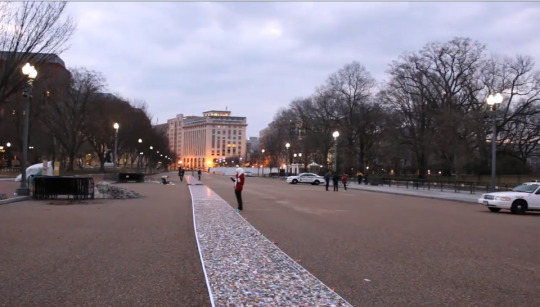
View On WordPress
0 notes
Link
Russia is importing barrel bomb specialists from Syria to help with its faltering war in Ukraine. Russian forces, by committing war crimes, have helped keep Syrian dictator Bashar al-Assad in power.
Barrel bombs – crude explosives packed in to a drum and dropped from a helicopter – were used to devastating effect throughout the Syrian war. The regime was also regularly accused of filling canisters with chlorine and dropping them on opposition held towns and cities, causing hundreds of deaths and sparking widespread alarm.
With no anti-aircraft weapons, the anti-Assad opposition had little to counter the Syrian military’s air supremacy, which was a big factor in the regime clawing back parts of the country after 10 years of war.
The situation is very different in Ukraine, however, where Ukrainian troops armed with lethal ground to air missiles can bring down Russian jets and helicopters, stalling advances and exposing ground forces to withering artillery fire.
The barrel bomb folks are not the first Syrian import by Russia into the Russo-Ukraine War. In April, Gen. Aleksandr Dvornikov, known as the “butcher of Syria”, was put in charge of the Russian military fighting in the current war.
But the thing about barrel bombs is that they are usually dropped from helicopters. The Syrian resistance never had much in the way of anti-aircraft weaponry. On the other hand, Ukrainians have been shooting down Russian helicopters at a steady rate. As of today, they’ve blown 170 Russian helicopters out of the sky. That’s in addition to 204 airplanes and 476 UAVs shot down.
So Russia is getting desperate. It wants its helicopter pilots to go on suicide missions against Ukrainian forces. When the first Russian helicopters carrying barrel bombs get hit by Ukrainian anti-aircraft fire, we’re going to see some spectacular fireworks. 💥
#invasion of ukraine#chemical weapons#syria#bashar al-assad#vladimir putin#aleksandr dvornikov#butcher of syria#war crimes#barrel bombs#helicopters#ukraine#anti-aircraft missiles#владимир путин#путин хуйло#александр дворников#военные преступления#руки прочь от украины!#слава україні!
0 notes
Text
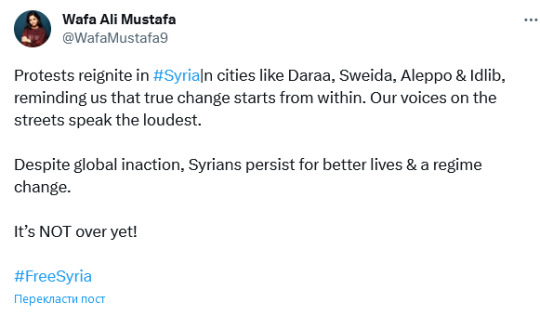
#syria#syrain war#assad regime#war crimes#crimes against humanity#freesyria#politics#western hypocrisy
95 notes
·
View notes
Text
Assad clearly doesn’t know how to take a hint.
He ought to be thrown out and sent to The Hague.
Also this.
Those fuckers deserve life in prison.
Feel free to reblog.
#dougie rambles#news#Suwayda#protests#syria#syrian civil war#druze#fuck Assad#anti fascism#trial#war crimes#terrorism#Paris
5 notes
·
View notes
Text
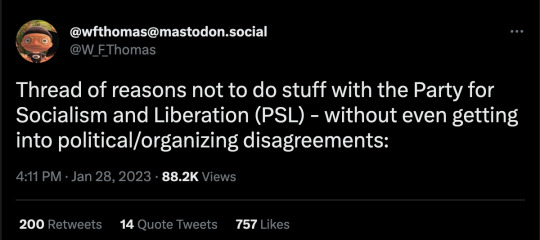
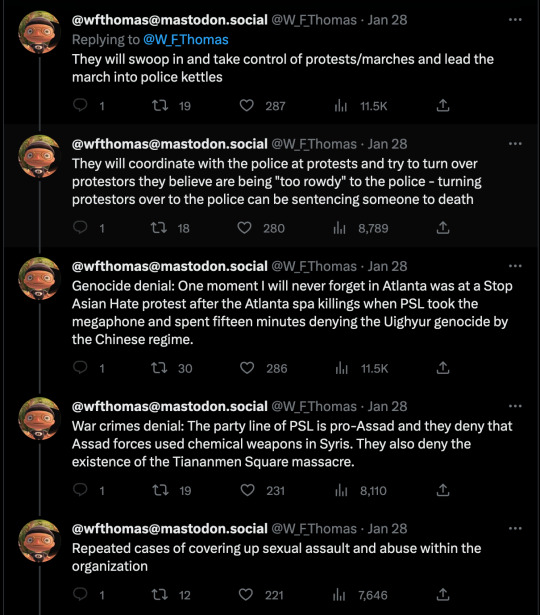
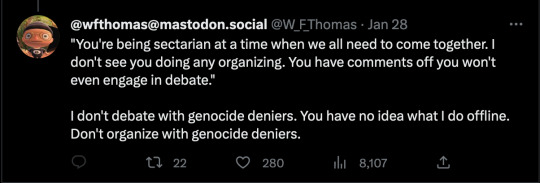
[Image description: a Twitter thread by @W_F_Thomas that reads:
Thread of reasons not to do stuff with the Party for Socialism and Liberation (PSL) - without even getting into political/organizing disagreements:
They will swoop in and take control of protests/marches and lead the march into police kettles
They will coordinate with the police at protests and try to turn over protestors they believe are being "too rowdy" to the police - turning protestors over to the police can be sentencing someone to death
Genocide denial: One moment I will never forget in Atlanta was at a Stop Asian Hate protest after the Atlanta spa killings when PSL took the megaphone and spent fifteen minutes denying the Uighyur genocide by the Chinese regime.
War crimes denial: The party line of PSL is pro-Assad and they deny that Assad forces used chemical weapons in Syris. They also deny the existence of the Tiananmen Square massacre.
Repeated cases of covering up sexual assault and abuse within the organization
"You're being sectarian at a time when we all need to come together. I don't see you doing any organizing. You have comments off you won't even engage in debate." I don't debate with genocide deniers. You have no idea what I do offline. Don't organize with genocide deniers.
/end ID]
526 notes
·
View notes
Text
[ 📹 Scenes from the results of the latest Israeli war crime and massacre of civilian Palestinian families after the Israeli occupation army bombed s civilian residence belonging the Al-Arabi family, west of the Nuseirat Camp, killing a large number of civilians, and wounding dozens of others.]
🇮🇱⚔️🇵🇸 🚀🚀🏘️💥 🚨
ISRAELI OCCUPATION LEVELS ANOTHER CIVILIAN HOME IN THE CENTRAL GAZA STRIP
In yet another atrocity, the Israeli occupation air forces bombed a residential home belonging to the Al-Arabi family, northwest of the Nuseirat Camp, killing more than five civilians and wounding dozens of others, while a nearby Mosque in the camp was also completely leveled.
Similarly, Zionist artillery detatchments shelled Al-Assad Tower, in the town of Al-Nuseirat, in the central Gaza Strip.
In another horrific discovery, local civil defense personnel working to recover the decomposing corpses of martyred civilians under the rubble and debris that now define the Gaza Strip, crews discovered several bodies under sand barriers erected by the Israeli occupation, while at least 4 decomposing bodies were found in the Khan Yunis governate throughout the day.
As a result of Israel's ongoing special genocide operation in the Gaza Strip, the death toll among the population of Gaza has risen in excess of 33'729, including over 9'500 women and 14'500 children, while 76'371 others have been wounded since the start of the current round of Zionist aggression beginning with the events of October 7th, 2023.
#source1
#source2
#source3
#videosource
@WorkerSolidarityNews
#gaza#gaza strip#gaza news#genocide#genocide in gaza#israeli genocide#israeli war crimes#war crimes#crimes against humanity#israeli occupation forces#israeli military#israeli occupation#israel#palestine#palestine news#palestinians#free palestine#free gaza#middle east#israel palestine conflict#war#end the occupation#politics#news#geopolitics#world news#global news#international news#breaking news#current events
29 notes
·
View notes
Text
youtube
The Israel & Palestine Double Standard | Douglas Murray
I'm so fed up of the double standards on all of this. Hundreds and hundreds of thousands of Muslims have been killed in the last 12 years by Bashar al-Assad and other Muslims in the civil war in Syria.
There's no one on the streets of Sydney or Melbourne. There's no one on the Streets of London. We have seen hundreds of thousands of people killed in the last decade in Yemen, Muslims being killed. There's no one on the streets of Melbourne. Nobody is standing outside the Sydney Opera House calling gas the Hutus or gas the Shia, gas the...
Nobody's marching for the dead Muslims in Yemen. Their co-religionists -- we're always told about care so much about their co-religionists -- don't give a damn about their co-religionists. They really don't.
Muslims do not love other Muslims. They have no love for them. They have no love for the Palestinian peoples. None. If they had any, the Jordanians would have taken in the West Bank Palestinians, Egyptians would have taken in the territory they used to run, the Gaza, and own the Gaza. And they would have taken in the Palestinians from the Gaza. Why have the Egyptians made sure that not one Palestinian is allowed to leave Gaza? Why do they make sure that their border wall is tough as anything?
What do they mind? One thing. Jews living. Jews living and Jews winning. It hits them deep in their soul, in their psyche. It's an ancient, ancient hatred. Perhaps the most ancient among the monotheisms. And the deepest and the ugliest, the nastiest. And the one that that has been least addressed.
And we've imported it. As we sit here, roughly the same population of the Gaza is being forcibly moved by the government of Pakistan. Almost 2 million Muslims are being moved by the Pakistani authorities into Afghanistan. Okay. We have a very large Pakistani community here in the UK. If their country of origin can do that, why can't we?
If it comes to that. If it has to come to that. And why does nobody notice this, why is nobody saying this is an appalling war crime by the Pakistani government? Well, only because there are so many Pakistani politicians and others in the UK and other countries who have a deep connection to their country of origin and would never want to see it looked at in a bad way. They will not criticize that. They haven't said a word about that.
So no, I think that if you are zoning in, zooming in on Israel, lambasting Israel and are basically not bothered with everything else in the world, you're not motivated by anything other than being anti-Jewish, antisemitic of course. And it just has to be said.
I mean, I've said this so many times that I tire myself with it but, it's necessary to say. Antisemitism is a shape shifter. It's a shape-shifting virus. It can come from anywhere. At times in the past, it was the case that people didn't like Jews because they were seen to be a different religion and strange and different, and so they were hated for their religion. Then after the wars of religion, you couldn't hate anyone for their religion, so people started to hate the Jews for their race. And after the Holocaust, you couldn't hate people because of their race anymore, so people hated the Jews because of their nation. On and on...
#Douglas Murray#islam#gaza#gaza strip#palestine#palestinians#israel#egypt#jordan#pakistan#hypocrisy#double standard#antisemitism#religion is a mental illness
22 notes
·
View notes
Text
The US is preparing to sanction an Israeli military unit, the Netzah Yahuda battalion, accused of committing war crimes.
The sanctions would apparently be under the Leahy Law, which as per the article "prevents US funding or training being used for foreign military units credibly implicated in gross human rights violations." Notably, the alleged violations, including the death of an 80 year old Palestinian-American, Omar Assad, are from before the current war.
The US also just sanctioned an "Israeli far-right activist" who they say "had "engaged in destabilizing violence affecting the West Bank."'
"Washington - Israel's main ally - has never suspended aid to an IDF unit before."
The government of Israel is, of course, protesting, and trying to get the Biden administration to reverse course. So we'll see how this unfolds in the coming days. I will say, though, that I both believe there must be accountability for how US arms and other aid are used, that the US must adhere to it's own laws, and that I generally prefer carefully targeted sanctions like these to sweeping economic sanctions against an entire country (such as those advocated by the BDS Movement against Israel), as such broad sanctions tend to hurt innocent people as much as or more than the guilty ones.
19 notes
·
View notes